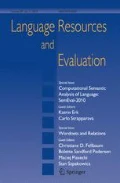Abstract
This study reports on a statistical approach to Francophone African literature, addressing the issues of discourse bias and the specificity of female writing as against male. The research is based on a comparison of all the characters present in 20 novels written by male and female African authors, under the headings of importance, power and attitude. It suggests that a number of significant differences characterize the make-up of novels written by African female and male authors.
Similar content being viewed by others
References
Burrows, John. “‘An Ocean Where Each Kind...’: Statistical Analysis and some Major Determinants of Literary Style.”Computers and the Humanities, 23 (1989), 309–21.
Burrows, John. “Computers and the Study of Literature.” InComputers and Written Texts. Ed. Christopher Butler. Oxford, Blackwell, in press.
Close, Elizabeth. “La Presse et les femmes: Madame le Directeur ou Madame la Directrice.”Australian Journal of French Studies, 30-1 (1993), 116–41.
Colonna, Vincent.L'Autofiction, essai de la fictionnalisation de soi en littérature. Unpublished Doctoral thesis. 2 vol. Paris: Ecole des Hautes Etudes en Sciences Sociales, n.d.
Fournier, Hanna and Delbert Russell. “A Study of Sex-Role Stereotyping in the Oxford English Dictionary 2E.”Computers and the Humanities, 26 (1992), 13–20.
Gershuny, H. Lee. “Sexism in Dictionaries and Texts: Omissions and Commissions.” InSexism and Language. Eds. Alleen Pace Nilsenet al. Urbana: National Council of Teachers of English, 1977, pp. 143–60.
Glaudes, Pierre and Yves Reuter, eds.Personnage et histoire littéraire. Actes du colloque de Toulouse, mai 1990. Toulouse: Presses Universitaires du Mirail, 1991.
Hamon, Philippe.Le Personnel du roman. Le système des personnages dans les Rougon-Macquart d'Emile Zola. Genève: Droz, 1983.
Hughes, Sarah. “Beyond Eurocentrism: Developing World Women's Studies.”Feminist Studies, 18, 2 (1992), 389–404.
Irizarry, Estelle. “A Computer-Assisted Investigation of Gender-Related Idiolect in Octavio Paz and Rosario Castellanos.”Computers and the Humanities, 26 (1992), 103–17.
Kolodny, Annette. “Dancing Through the Minefield: Some Observations on Theory, Practice, and Politics of a Feminist Literary Criticism.” InThe New Feminist Criticism. Ed. Elaine Showalter. New York: Pantheon, 1985, pp. 144–67.
Mazrui, Ali. “The Black Woman and the Problem of Gender: An African Perspective.”Research in African Literatures, 24-1 (1993), 87–104.
Merideth, Eunice. “Gender Patterns in Henry James: A Stylistic Approach to Dialogue inDaisy Miller, The Portrait of a Lady, andThe Bostonians.” InLiterary Computing and Literary Criticism. Ed. Rosanne G. Potter. Philadelphia: University of Pennsylvania Press, 1989, pp. 189–206.
Miller, Casey and Kate Swift.Words and Women: New Language in New Times. New York: Doubleday & Anchor, 1976.
Nnaemeka, Obioma. “Mariama Bâ: Parallels, Convergence, and Interior Space.”Feminist Issues, 10, 1 (1990), 13–36.
Ogundipe-Leslie, Molara. “Beyond Hearsay and Academic Journalism: The Black Woman and Ali Mazrui.”Research in African Literatures, 24, 1 (1993), 105–12.
Ormerod, Beverley and Jean-Marie Volet.Romancières africaines d'expression française: le sud du Sahara. Paris: L'Harmattan, 1994.
Owusu, Kofi. “Canons under Siege: Blackness, Femaleness, and Ama Ata Aidoo'sOur Sister Killjoy.”Callaloo, 13 (1990), 341–61.
Potter, Rosanne. “Computer-assisted Research on Literary Texts, the Problem of ‘Messy Data Sets’.” InLa Critique littéraire et l'ordinateur — Literary Criticism and the Computer. Eds. Bernard Derval and Michel Lenoble. [Saint-Laurent, Ile de Montréal], Bernard Derval-Michel Lenoble, 1985, pp. 95–110.
Potter, Rosanne. “From Literary Output to Literary Criticism: Discovering Shaw's Rhetoric.”Computers and the Humanities, 23 (1989), 333–40.
Sellers, Susan.Language and Sexual Difference: Feminist Writing in France. London: Macmillan, 1991.
Shen, Yichin. “Womanhood and Sexual Relation in Contemporary Chinese Fiction by Male and Female Authors: A Comparative Analysis.”Feminist Issues, 12, 1 (1992), 47–68.
Spender, Dale.The Writing or the Sex? or Why You Don't Have to Read Women's Writing to Know It's No Good. New York: Pergamon, 1989.
Tannen, Deborah.You Just Don't Understand: Women and Men in Conversation. New York: William Morrow, 1990.
Trudeau, Danielle. “Changement social et changement linguistique: la question féminine.”The French Review, 62 (1988), 77–87.
Volet, Jean-Marie. “Francophone African Women Novelists from sub-Saharan Africa: Rescuing French Literature from terminal Boredom?”New Researcher, 1/2 (1992), 92–111.
West, Lois. “Feminist National Social Movements: Beyond Universalism and Towards a Gender Cultural Relativism.”Women's Studies International Forum, 15, 5/6 (1992), 563–79.
Author information
Authors and Affiliations
Additional information
Beverley Ormerod, from Jamaica, is currently associate professor of French at the University of Western Australia. Her publications concerning the literature of the French Caribbean and Francophone Africa includeAn Introduction to the French Caribbean Novel (London: Heinemann, 1985) andRomancières africaines d'expression française, with J.-M. Volet (Paris: L'Harmattan, 1994). Jean-Marie Volet, born in Switzerland and currently Honorary Research Fellow in the Department of French Studies at the University of Western Australia, is pursuing research in the fields of African literature and women's writing. His publications includeLa Parole aux Africaines (Amsterdam: Rodopi, 1993) andRomancières africaines d'expression française, with B. Ormerod (Paris: L'Harmattan, 1994). Hélène Jaccomard, a tutor in the Department of French Studies at the University of Western Australia and a translator, has research interests in autobiography and literary theory. She has published a book onLe Lecteur et la lecture dans l'autobiographie française contemporaine (Geneva: Droz, 1994) and articles, including “Françoise d'Eaubonne: Accuser (la) Réception,”The French Review, 68, 3 (1994).
Rights and permissions
About this article
Cite this article
Ormerod, B., Volet, JM. & Jaccomard, H. The female voice and traditional discourse biases: The case of francophone African literature. Comput Hum 28, 353–367 (1994). https://doi.org/10.1007/BF01829970
Issue Date:
DOI: https://doi.org/10.1007/BF01829970




